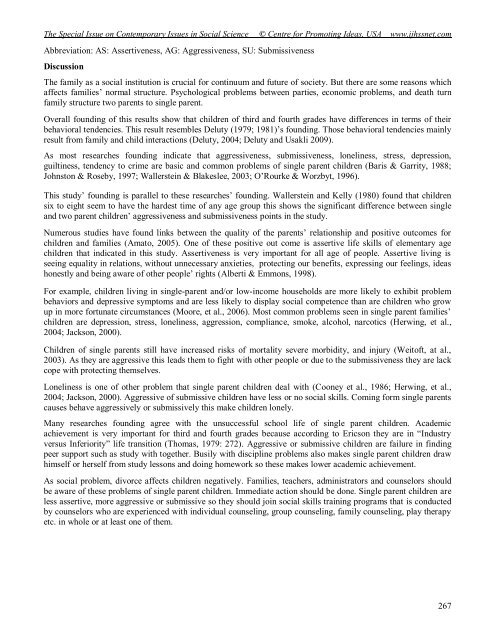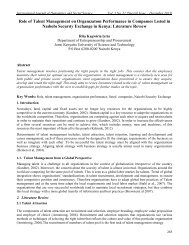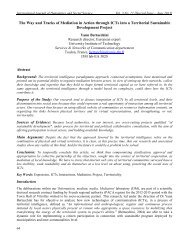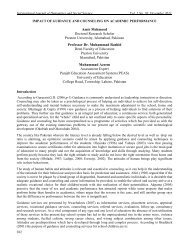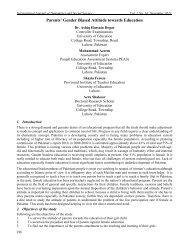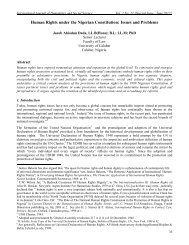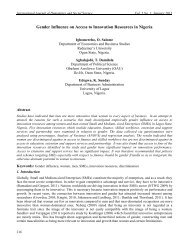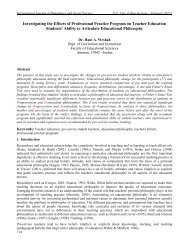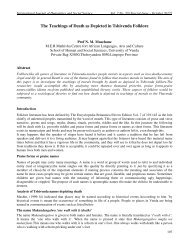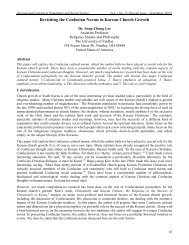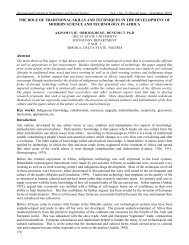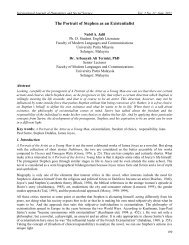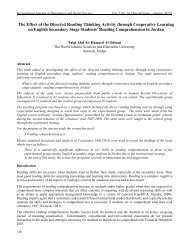Comparison of Single and Two Parents Children in terms of ...
Comparison of Single and Two Parents Children in terms of ...
Comparison of Single and Two Parents Children in terms of ...
Create successful ePaper yourself
Turn your PDF publications into a flip-book with our unique Google optimized e-Paper software.
The Special Issue on Contemporary Issues <strong>in</strong> Social Science<br />
Abbreviation: AS: Assertiveness, AG: Aggressiveness, SU: Submissiveness<br />
Discussion<br />
© Centre for Promot<strong>in</strong>g Ideas, USA www.ijhssnet.com<br />
The family as a social <strong>in</strong>stitution is crucial for cont<strong>in</strong>uum <strong>and</strong> future <strong>of</strong> society. But there are some reasons which<br />
affects families‟ normal structure. Psychological problems between parties, economic problems, <strong>and</strong> death turn<br />
family structure two parents to s<strong>in</strong>gle parent.<br />
Overall found<strong>in</strong>g <strong>of</strong> this results show that children <strong>of</strong> third <strong>and</strong> fourth grades have differences <strong>in</strong> <strong>terms</strong> <strong>of</strong> their<br />
behavioral tendencies. This result resembles Deluty (1979; 1981)‟s found<strong>in</strong>g. Those behavioral tendencies ma<strong>in</strong>ly<br />
result from family <strong>and</strong> child <strong>in</strong>teractions (Deluty, 2004; Deluty <strong>and</strong> Usakli 2009).<br />
As most researches found<strong>in</strong>g <strong>in</strong>dicate that aggressiveness, submissiveness, lonel<strong>in</strong>ess, stress, depression,<br />
guilt<strong>in</strong>ess, tendency to crime are basic <strong>and</strong> common problems <strong>of</strong> s<strong>in</strong>gle parent children (Baris & Garrity, 1988;<br />
Johnston & Roseby, 1997; Wallerste<strong>in</strong> & Blakeslee, 2003; O‟Rourke & Worzbyt, 1996).<br />
This study‟ found<strong>in</strong>g is parallel to these researches‟ found<strong>in</strong>g. Wallerste<strong>in</strong> <strong>and</strong> Kelly (1980) found that children<br />
six to eight seem to have the hardest time <strong>of</strong> any age group this shows the significant difference between s<strong>in</strong>gle<br />
<strong>and</strong> two parent children‟ aggressiveness <strong>and</strong> submissiveness po<strong>in</strong>ts <strong>in</strong> the study.<br />
Numerous studies have found l<strong>in</strong>ks between the quality <strong>of</strong> the parents‟ relationship <strong>and</strong> positive outcomes for<br />
children <strong>and</strong> families (Amato, 2005). One <strong>of</strong> these positive out come is assertive life skills <strong>of</strong> elementary age<br />
children that <strong>in</strong>dicated <strong>in</strong> this study. Assertiveness is very important for all age <strong>of</strong> people. Assertive liv<strong>in</strong>g is<br />
see<strong>in</strong>g equality <strong>in</strong> relations, without unnecessary anxieties, protect<strong>in</strong>g our benefits, express<strong>in</strong>g our feel<strong>in</strong>gs, ideas<br />
honestly <strong>and</strong> be<strong>in</strong>g aware <strong>of</strong> other people‟ rights (Alberti & Emmons, 1998).<br />
For example, children liv<strong>in</strong>g <strong>in</strong> s<strong>in</strong>gle-parent <strong>and</strong>/or low-<strong>in</strong>come households are more likely to exhibit problem<br />
behaviors <strong>and</strong> depressive symptoms <strong>and</strong> are less likely to display social competence than are children who grow<br />
up <strong>in</strong> more fortunate circumstances (Moore, et al., 2006). Most common problems seen <strong>in</strong> s<strong>in</strong>gle parent families‟<br />
children are depression, stress, lonel<strong>in</strong>ess, aggression, compliance, smoke, alcohol, narcotics (Herw<strong>in</strong>g, et al.,<br />
2004; Jackson, 2000).<br />
<strong>Children</strong> <strong>of</strong> s<strong>in</strong>gle parents still have <strong>in</strong>creased risks <strong>of</strong> mortality severe morbidity, <strong>and</strong> <strong>in</strong>jury (Weit<strong>of</strong>t, at al.,<br />
2003). As they are aggressive this leads them to fight with other people or due to the submissiveness they are lack<br />
cope with protect<strong>in</strong>g themselves.<br />
Lonel<strong>in</strong>ess is one <strong>of</strong> other problem that s<strong>in</strong>gle parent children deal with (Cooney et al., 1986; Herw<strong>in</strong>g, et al.,<br />
2004; Jackson, 2000). Aggressive <strong>of</strong> submissive children have less or no social skills. Com<strong>in</strong>g form s<strong>in</strong>gle parents<br />
causes behave aggressively or submissively this make children lonely.<br />
Many researches found<strong>in</strong>g agree with the unsuccessful school life <strong>of</strong> s<strong>in</strong>gle parent children. Academic<br />
achievement is very important for third <strong>and</strong> fourth grades because accord<strong>in</strong>g to Ericson they are <strong>in</strong> “Industry<br />
versus Inferiority” life transition (Thomas, 1979: 272). Aggressive or submissive children are failure <strong>in</strong> f<strong>in</strong>d<strong>in</strong>g<br />
peer support such as study with together. Busily with discipl<strong>in</strong>e problems also makes s<strong>in</strong>gle parent children draw<br />
himself or herself from study lessons <strong>and</strong> do<strong>in</strong>g homework so these makes lower academic achievement.<br />
As social problem, divorce affects children negatively. Families, teachers, adm<strong>in</strong>istrators <strong>and</strong> counselors should<br />
be aware <strong>of</strong> these problems <strong>of</strong> s<strong>in</strong>gle parent children. Immediate action should be done. <strong>S<strong>in</strong>gle</strong> parent children are<br />
less assertive, more aggressive or submissive so they should jo<strong>in</strong> social skills tra<strong>in</strong><strong>in</strong>g programs that is conducted<br />
by counselors who are experienced with <strong>in</strong>dividual counsel<strong>in</strong>g, group counsel<strong>in</strong>g, family counsel<strong>in</strong>g, play therapy<br />
etc. <strong>in</strong> whole or at least one <strong>of</strong> them.<br />
267


